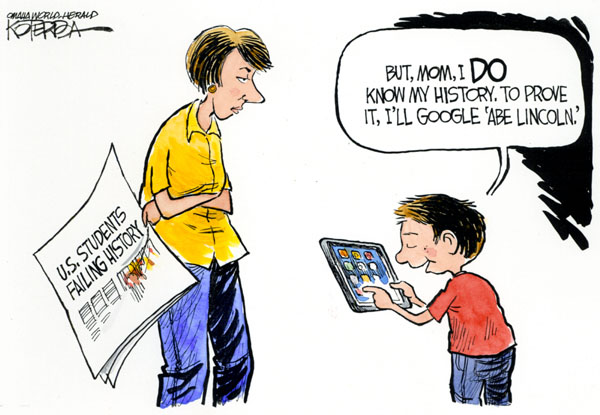
“History”
Spoon-feeding (verb) definition: providing someone with so much help or information that they do not need to think for themselves.
The generation effect is a phenomenon where generating material, rather than passively receiving it, enhances learning and retention. It suggests that struggling to generate an answer on your own, even a wrong one, enhances learning. It is the opposite of spoon-feeding. We remember information that has been generated by our mind better than material that we’ve merely read or heard.
Educators and psychologists have long extolled the benefits of active learning techniques such as organizing material, self-explaining, learning through experience, and practicing retrieval. Underlying all these strategies is the generation effect.
- When teaching, don’t spoon-feed answers to your students. Require them to think for themselves and produce their own answers. Ask more questions and don’t offer quick answers. Use pop-quizzes, not as a test of recall for material already discussed, but as a catalyst for creative thinking.
- When learning, don’t just rely on easily accessible written materials. Don’t be too quick to use Google or other search engines to find quick answers. Force yourself to think through issues and generate your own answers, even if they’re wrong. Then, if necessary, access reliable sources to confirm truth.
Socrates was spot-on when he would ask his pupils a question and force them to generate their own answers. That’s the best way to teach and learn.

Yes, often learning and joy in the “process” and not just in only finding an answer. An “A” grade can be great, but likely what it took to earn it may be of more ultimate value. Being advised, “how” to think, to determine, can reap more benefits than the “what” — But even that at times can have its value (i.e., the Bible). Perspective is important.
Thanks, Jan, for sharing your thoughts. I like the thought – “how you think is more important than what you think” because how we think will ultimately determine what we think. You’re right, the process is key.
Don, as a lifelong educator, I understand the effectiveness of the Socratic method of teaching and its impact on generative thinking. Throughout the Gospels we see Jesus using this same methodology, e.g., “Who do people say the Son of Man is”? Who do you say that I am”? Woman, where are your accusers”? In fact, Jesus asked over 300 questions as recorded in Scripture. The Master Teacher knew how to get His disciples to think critically by asking the right questions.
Thanks, Bill, for your good insight into biblical examples of the generation effect. I’m trying to incorporate more questions into all my conversations. I once heard the phrase “people learn best when they hear the sound of their own voice.”
When I was 7 years old, I joined the “Look It UP Club” that was sponsored by World Book Encyclopedia. Our motto was ,”We never guess. We look it up.” I’m still a charter member.
I love that concept – the “Look If Up Club” Thanks, Clyde.
Don, this is thought-provoking, especially since I am currently re-reading Ernest Dimnet’s “The Art of Thinking.” When I lead women’s classes, it excites me to hear when the study questions have led them to other paths (not simply to giving the “right” answer), as the Spirit leads. Listening to Him increases and firms up our learning. Also, taking notes in our own words solidifies our learning. I send out a weekly meditation, and your practice of giving an exercise is one I need to use more often. Thanks for stimulating our thinking!
Sharon, thanks for sharing your thoughts. They are good. I’ll check into Dimnet’s book. You’re right, in most Bible study discussion groups, most people feel compelled to say the “right” things, so there’s seldom any “new” thoughts expressed. Don
Don:
You are spot on! When I taught high school English, most students could not write effectively or think critically. I made a poster of the critical thinking skills with brief definitions so that during our discussions of a text, we could focus on what was knowledge, comprehension, application, analysis, synthesis, and evaluation. The results were stunning: Slowly, students realized their weakness, and they strengthened their skills. By the end of the year, their writing, discussions, and lives changed. What a wonderful experience for all…now we’re helping our grandboys. Thanks for focusing on this important issue so I could remember the joy of learning.
Sharon, I wish you had been my high school English teacher. Do you still have a brief definition of those six words? If so, would you send them to me? Take care.